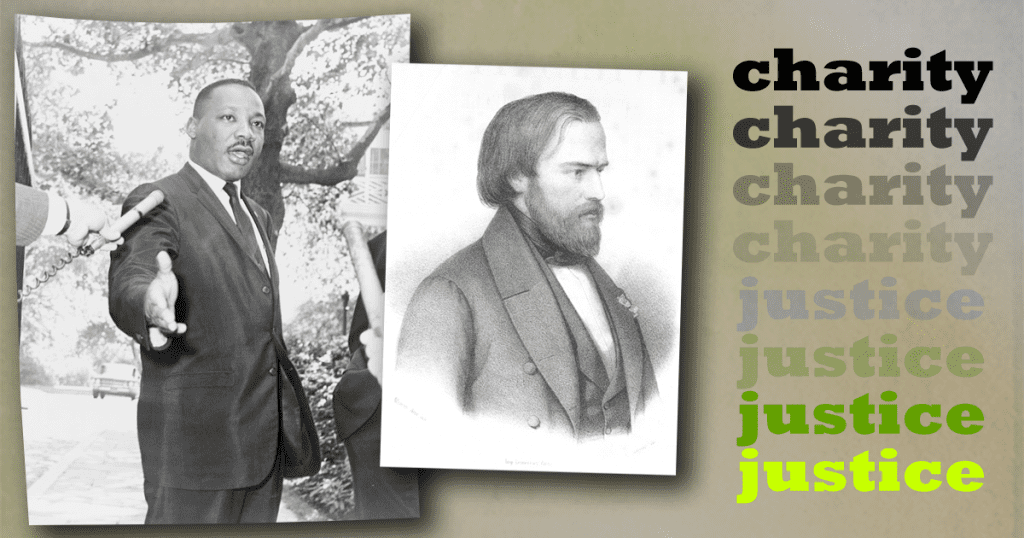
Will donating to a food bank alleviate hunger pangs? Absolutely. But it can never eradicate hunger itself.
Charity gives, but justice changes. It’s time to place the latter above the former.
Glen Pearson, Director of the London Food Bank and former Member of (Canadian) Parliament, recently wrote an article in the Huffington post which provides some historical perspective…
Martin Luther King Jr. had exactly one year left before an assassin’s bullet struck him down and traumatized a nation. He had spent recent months attempting to break through the “indifference barrier” by drawing a direct link between racism to poverty. It wasn’t enough, he would maintain, to seek equal rights for black Americans if they remained mired in poverty. And so on this particular night, April 4, 1967, at New York City’s Riverside Church, he laid it out as he had seen and experienced it:
“A true revolution of values will soon cause us to question the fairness and justice of many of our past and present policies. On the one hand we are called to play the Good Samaritan on life’s roadside, but that will be only an initial act. One day we must come to see that the whole Jericho Road must be transformed so that men and women will not be constantly beaten and robbed as they make their journey on life’s highway. True compassion is more than flinging a coin to a beggar. It comes to see that an edifice which produces beggars needs restructuring.”
Those words echo those of Frederic Ozanam.
Pearson elaborates…
And there it was. He was calling on the nation to give more to charity, but to also change its structure so that human justice and not mere charity became the ultimate motivator and goal. He assumed most knew the story of the Good Samaritan, of how a man is beaten and robbed, left by the road side, and of how a compassionate Samaritan helped him. He praised such actions, seeing them as a great aspect of the American character. Yet he reminded his generation that true compassion is attacking the forces and systems that leave others in need in the first place.
Will donating to a food bank alleviate hunger pangs? Absolutely. But it can never eradicate hunger itself.
As King saw it, to those living on the margins of our communities, acts of charity and compassion should be our very first response to meet the need. But then there is the next stage. What caused it? Who is responsible? How can we change things at their source so that acts of charity are not as required as those where we help those who begin to find their footing?
Pearson’s questions can perhaps sting us as much as the atheists questions stung Frederic when he was asked what is your church and your God doing for the marginalized of his day. He continues,
The time has seriously come to ask ourselves, individually and collectively, “Will we just let everybody worry about themselves and rely on charitable donations of time and money to get by? Is this what we would want for ourselves if we remained mired in poverty? If so, then it won’t be too long until the damage created by the present structure will become so great that prosperity will never be gained other than by a few.
Or will we be different? Will we reform our actions and vote against the deep and unjust structural inequalities at our nation’s core that favour power and abandon the powerless? To that wonderful Canadian trait of generosity and charity can we add a passion and understanding for justice? There are no quick fixes in justice — it is a long road — but the results last decades and lift millions out of their despair. Charity by itself is surely limited, but when added to sincere efforts at systemic restructuring it can become a springboard for change. Without serious reform, charity just leads to an ever-increasing cycle of hopelessness.
Charity gives, but justice changes. It’s time to place the latter above the former.







Thank you, this is a great article and the interesting thing is it is not new. We truly must change our thoughts. I would love to do a power point on this to present at some of the annual meetings. I find more and more the partnership between Charity and Justice is widening. Some people do not see the hole those in poverty face and would rather cover them with dirt instead of pulling them out and giving them the tools they need to start over.
Well done, we can lift so many roadblocks if we start thinking out of the box.
Thanks for taking the time to comment. Some might find the following link to systemic change resources helpful
http://vinformation.famvin.org/vincentian-formation-resources/systemic-change-resources/
Also
http://vinformation.famvin.org/tagged_cst/